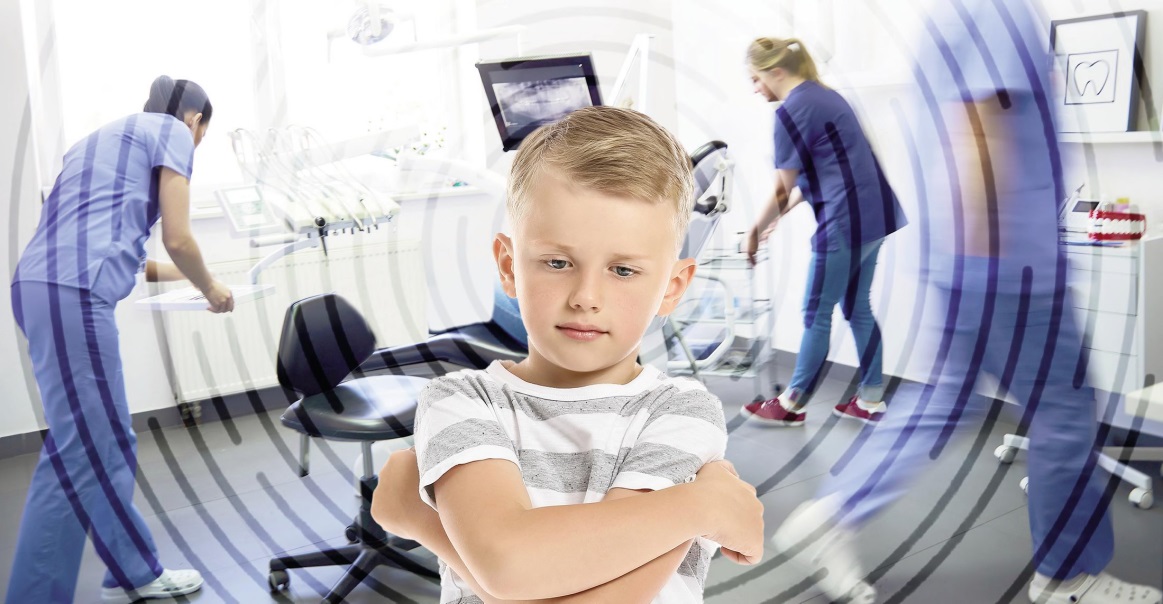
DENTAL TREATMENT OF THE AUTISTIC PATIENT
BY SCOTT RUVO, DDS
According to the CDC, approximately 1 in 50 BY SCOTT RUVO, DDS children are born with some degree of Autism Spectrum Disorder (ASD).
People with ASD have difficulty communicating and many have sensory sensitivities that can make routine dental care difficult. Barriers such as communicating pain, difficult behavior characteristics, changes in a normal routine and being put in a new surrounding such as a dental office need to be overcome in order to provide optimal dental care for the ASD patient.
Prevention of dental issues starts at home with routine dental hygiene. It is best to try and establish such a routine at an early age and incorporate it into their lives. Starting with simply a wash towel with a small amount of fluoride on it and gently rubbing it over the child's teeth is a good place to start. If they have taste or texture issues, there are a variety of toothpastes with various flavors and textures you can experiment with. As they grow older and become more accustomed to a dental hygiene routine, you can start using a regular toothbrush, or if they like the feeling of vibration, there are many electric toothbrushes on the market that will make oral hygiene more pleasant for them.
Routine dental visits are important, but often present a challenge for the ASD patient. A new environment with bright lights, different smells and lots people around can be a bit disconcerting to the patient. But, with the right office, it can also prove to be a positive experience. This is why it is so important to find a "dental home" in which the ASD patient feels comfortable. Find an office in which the treating dentist and staff will take the time to establish a relationship with the patient. Start with a pretreatment visit, so the patient, as well as, the caregiver/parent can establish a connection with the individual dentist. Many times, it's just as important for the caregiver or parent to feel comfortable as it is for the ASD patient. Discuss with the dentist the patient's individual needs and prefer
ences, as well as anything you might think would help during the appointment, such as headphones, music, or a weighted blanket.
Since communication is often a hurdle, it is important for both the dentist and the patient to learn how to communicate with each other, on an individual patient basis. Each ASD patient has their own individual way of communicating, and it's important for the treating dentist to know how they can best communicate with the patient. Some patients communicate with physical signals, such as raising a hand, while others have used cards with symbols or pictures on them. I even have one patient who uses an iPad very effectively.
Try to keep the appointments short, yet efficient. If treatment is needed, try to get it accomplished in sections, such as the upper left or upper right during one visit, as long as it's not too extensive. Many ASD patients have a difficult time with x-rays. A full series is always best, but if the patient cannot tolerate it, a panorex (1 X-ray that goes around the head) may need to be used. ASD patients can't always communicate when there is a dental problem, therefore, regular visits are important. It is easier for the patient when the dental visit is a part of their life routine and the visits are evenly spaced, as opposed to an intermittent surprise. With regular visits, if any dental issues arise, the treatment will be minor and more easily fixed.
In order for ASD patients, to enjoy a healthy lifestyle, oral health is just as important as their overall healthcare. Creating a routine of regular daily hygiene coupled with regular dental visits at an office they feel connected to, will provide them a lifetime of good oral health.•
ABOUT THE AUTHOR:

Scott Ruvo, DDS graduated from University of Illinois Chicago Dental School and has been in private practice in Sparta NJ for over 25 years. Dr. Ruvo is an attending at the Morristown Hospital Dental clinic where he enjoys teaching residents. He is an active member of the American Dental Association and is a Trustee in the New Jersey Dental Association. Dr. Ruvo grew up and lives in Sussex County, where he enjoys fishing, hiking, biking and photography, with his wife and two children.